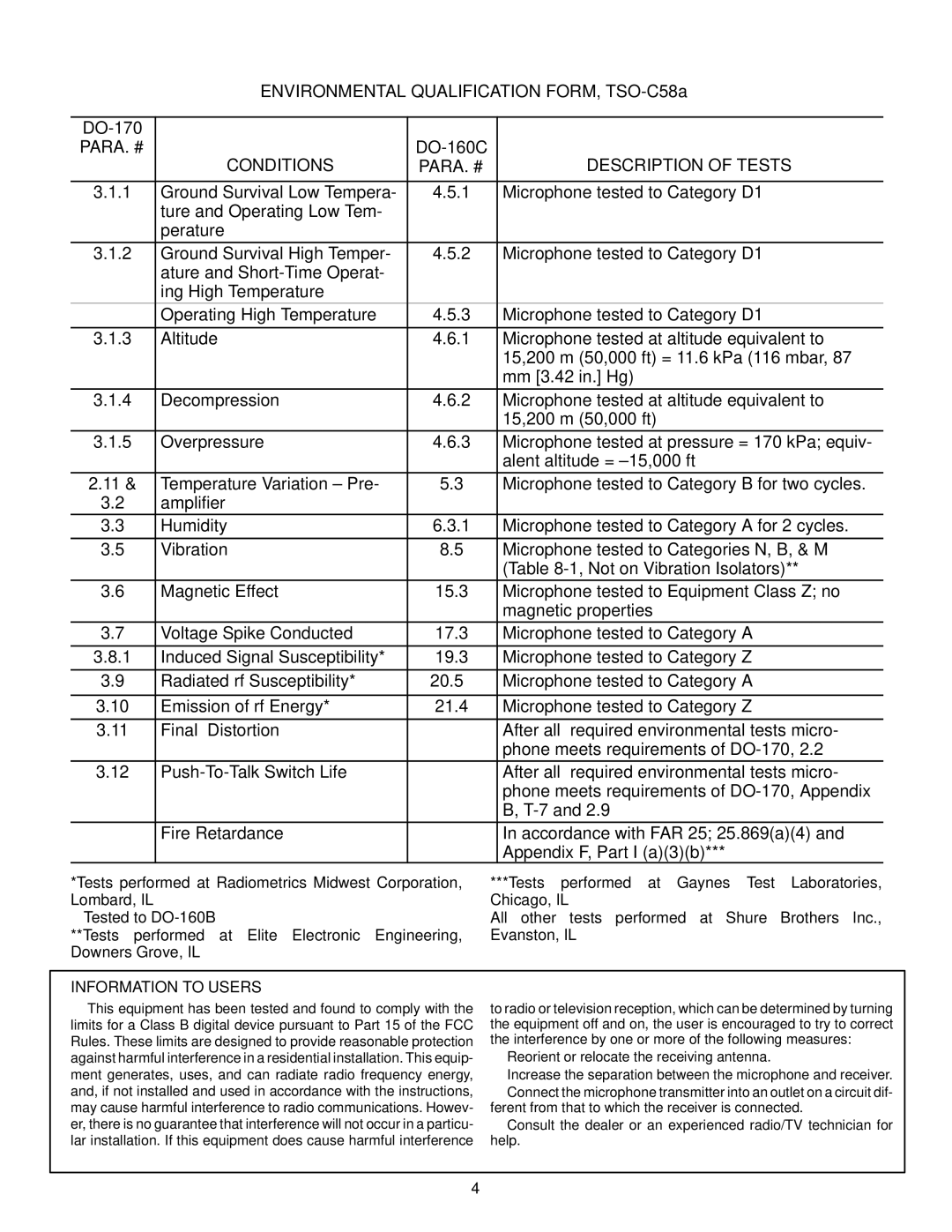
ENVIRONMENTAL QUALIFICATION FORM,
|
|
| |
PARA. # | CONDITIONS | DESCRIPTION OF TESTS | |
| PARA. # | ||
|
|
|
|
3.1.1 | Ground Survival Low Tempera- | 4.5.1 | Microphone tested to Category D1 |
| ture and Operating Low Tem- |
|
|
| perature |
|
|
3.1.2 | Ground Survival High Temper- | 4.5.2 | Microphone tested to Category D1 |
| ature and |
|
|
| ing High Temperature |
|
|
|
|
|
|
| Operating High Temperature | 4.5.3 | Microphone tested to Category D1 |
|
|
|
|
3.1.3 | Altitude | 4.6.1 | Microphone tested at altitude equivalent to |
|
|
| 15,200 m (50,000 ft) = 11.6 kPa (116 mbar, 87 |
|
|
| mm [3.42 in.] Hg) |
|
|
|
|
3.1.4 | Decompression | 4.6.2 | Microphone tested at altitude equivalent to |
|
|
| 15,200 m (50,000 ft) |
3.1.5 | Overpressure | 4.6.3 | Microphone tested at pressure = 170 kPa; equiv- |
|
|
| alent altitude = ±15,000 ft |
2.11 & | Temperature Variation ± Pre- | 5.3 | Microphone tested to Category B for two cycles. |
3.2 | amplifier |
|
|
3.3 | Humidity | 6.3.1 | Microphone tested to Category A for 2 cycles. |
|
|
|
|
3.5 | Vibration | 8.5 | Microphone tested to Categories N, B, & M |
|
|
| (Table |
3.6 | Magnetic Effect | 15.3 | Microphone tested to Equipment Class Z; no |
|
|
| magnetic properties |
3.7 | Voltage Spike Conducted | 17.3 | Microphone tested to Category A |
|
|
|
|
3.8.1 | Induced Signal Susceptibility* | 19.3 | Microphone tested to Category Z |
|
|
|
|
3.9 | Radiated rf Susceptibility*[ | 20.5[ | Microphone tested to Category A |
|
|
|
|
3.10 | Emission of rf Energy* | 21.4 | Microphone tested to Category Z |
|
|
|
|
3.11 | Final Distortion |
| After all required environmental tests micro- |
|
|
| phone meets requirements of |
3.12 |
| After all required environmental tests micro- | |
|
|
| phone meets requirements of |
|
|
| B, |
| Fire Retardance |
| In accordance with FAR 25; 25.869(a)(4) and |
|
|
| Appendix F, Part I (a)(3)(b)*** |
*Tests performed at Radiometrics Midwest Corporation, Lombard, IL
[Tested to
**Tests performed at Elite Electronic Engineering, Downers Grove, IL
***Tests performed at Gaynes Test Laboratories, Chicago, IL
All other tests performed at Shure Brothers Inc., Evanston, IL
INFORMATION TO USERS
This equipment has been tested and found to comply with the limits for a Class B digital device pursuant to Part 15 of the FCC Rules. These limits are designed to provide reasonable protection against harmful interference in a residential installation. This equip- ment generates, uses, and can radiate radio frequency energy, and, if not installed and used in accordance with the instructions, may cause harmful interference to radio communications. Howev- er, there is no guarantee that interference will not occur in a particu- lar installation. If this equipment does cause harmful interference
to radio or television reception, which can be determined by turning the equipment off and on, the user is encouraged to try to correct the interference by one or more of the following measures:
Reorient or relocate the receiving antenna.
Increase the separation between the microphone and receiver. Connect the microphone transmitter into an outlet on a circuit dif-
ferent from that to which the receiver is connected.
Consult the dealer or an experienced radio/TV technician for help.
4
